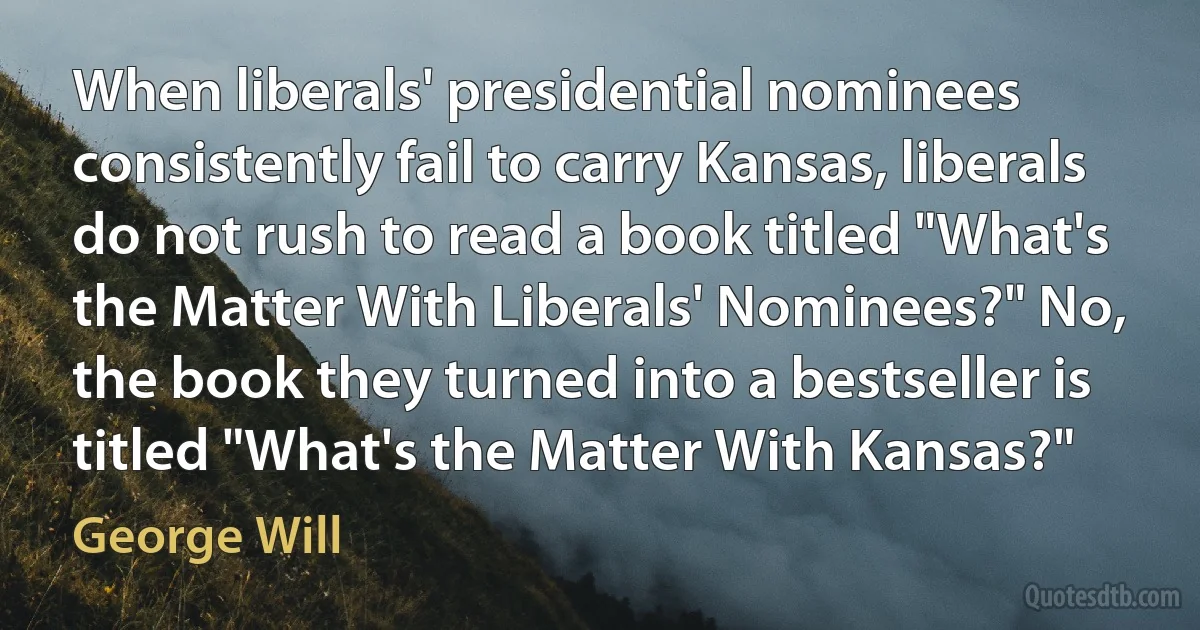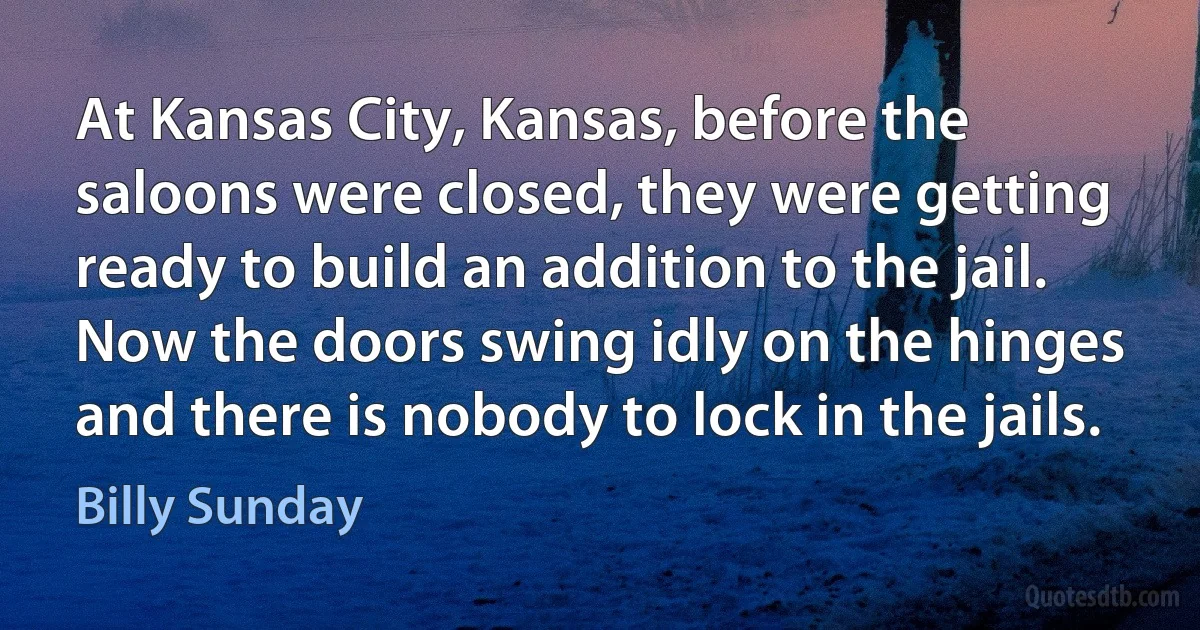Kansas Quotes - page 2
Contrary to several conflicting stories, I got the name "Count" right in Kansas City in 1936 while at the Reno Club. I was known as Bill Basie at that time. One night, while we were broadcasting, the announcer called me to the microphone for those usual few words of introduction. He commented that Bill Basie was a rather ordinary name, and further that there were a couple of well-known bandleaders named Earl Hines and Duke Ellington. Then he said, "Bill, I think I'll call you Count Basie from now on. Is that all right with you?" I thought he was kidding, shrugged my shoulders and replied, "OK." Well that was the last time I was ever introduced as Bill Basie. From then on, it was Count Basie, and I never did lose that nickname. It's funny the way those things will stick.

Count Basie
The point at which life becomes 'worthless,' and the point at which the means necessary to preserve it become 'extraordinary' or 'inappropriate,' are neither set forth in the Constitution nor known to the nine Justices of this Court any better than they are known to nine people picked at random from the Kansas City telephone directory...[therefore] even when it is demonstrated by clear and convincing evidence that a patient no longer wishes certain measures to be taken to preserve her life, it is up to the citizens of Missouri to decide, through their elected representatives, whether that wish will be honored.

Antonin Scalia
What's unfortunate is that most people regard the great leapers as being only the short guys who could dunk," said the 7-1 1/16 Wilt Chamberlain. "My sergeant [vertical leap] was higher than Michael Jordan's. When I went to Kansas, they had a 12-foot basket in the gym, because Dr. Phog Allen was advocating the 12-foot basket. I used to dunk on that basket. It was an effort, but I could do it.

Wilt Chamberlain
Bill Mayer, then the managing editor of the 'Lawrence Journal-World' recalled on of Wilt's impressive athletic feats: "We played Oklahoma in basketball on a friday night, here in Lawrence(, Kansas), When Oklahoma had one helluva team. And they pounded the living daylights out of Wilt, just beat him to a pulp. I think he got 32 points. This was on a friday, and the finals of the Big Seven indoor track championship were the next night in Kansas city in the Municipal Auditorium. Wilt goes in, and with a minimum of practice during the week-he had just been fiddling around-he sets a school record and ties for the Big Seven championship, jumping 6' 6 3/4""

Wilt Chamberlain
I stand for the square deal. But when I say that I am for the square deal, I mean not merely that I stand for fair play under the present rules of the game, but that I stand for having those rules changed so as to work for a more substantial equality of opportunity and of reward for equally good service. One word of warning, which, I think, is hardly necessary in Kansas. When I say I want a square deal for the poor man, I do not mean that I want a square deal for the man who remains poor because he has not got the energy to work for himself. If a man who has had a chance will not make good, then he has got to quit. And you men of the Grand Army, you want justice for the brave man who fought, and punishment for the coward who shirked his work. Is that not so?

Theodore Roosevelt
The advantage it had gained it has steadily maintained. 'This is our matter, you know', it said. 'Just please let us alone'. It was let alone. Texas was ceded for Florida, completing the sea-line of slavery; and when slavery was ready Texas was taken back again, as when, afterwards, slavery had secured its share of the bargain, the Missouri Compromise was broken. In due order came the Mexican war and its consequences, the Fugitive-slave Bill and the loud chatter about saving the Union, so incessant that every thoughtful man asked himself. Is the casket more than the gem - the body than the soul - the Union than liberty? Then came the bloody tragedy of Kansas, with its justification by the President of the United States and by the Chief Justice; and I think no one will deny that Mr. Stephens is correct in calmly congratulating himself that slavery has carried all the important objects for which it has striven.

George William Curtis
All the benefit that a New Yorker gets out of Kansas is no more than what he might get out of Saskatchewan, the Argentine pampas, or Siberia. But New York to a Kansan is not only a place where he may get drunk, look at dirty shows and buy bogus antiques; it is also a place where he may enforce his dunghill ideas upon his betters.

H. L. Mencken
I am an American. Black. Conservative. I don't use "African American", because I'm American, I'm black and I'm conservative. I don't like people trying to label me. "African American" is socially acceptable for some people, but I am not some people. ... Barack Obama is more of an international. I think he's out of the mainstream and always has been. Look, he was raised in Kenya, his mother was white from Kansas and her family had an influence on him, it's true, but his dad was Kenyan, and when he was going to school he got a lot of fellowships, scholarships, he stayed in the academic environment for a long time. He spent most of his career as an intellectual.

Herman Cain
Thus, in a crucial way, the Kansas hearings repeat the pattern set by the Scopes Trial, which has been repeated many times since, namely, evolutionists escaped critical scrutiny by not having to undergo cross-examination. In this case, they accomplished the feat by boycotting the hearings. I therefore await the day when the hearings are not voluntary but involve subpoenas that compel evolutionists to be deposed and interrogated at length on their views.

William A. Dembski



